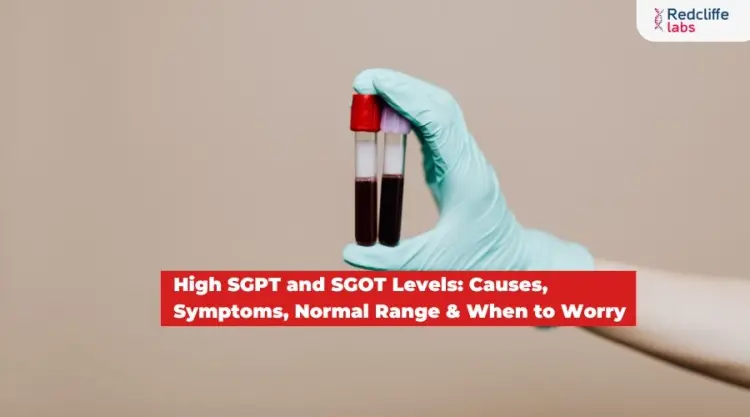Blood
Unlock special
discount on
this package
Login to Unlock 🔓
NABL Accredited lab*

Booking Benefits Unlocked Worth FREE 799

Report Consultation

Diet Plan
*Available once your report is generated.
At Redcliffe Labs, we have a single goal: to give India its right to quality diagnostics.
Customers served
Tests Processed Everyday
Cities
Collection Centres
World Class In-house Labs
Home Collection Experts
1 Test Parameters
Syphilis Antibodies
1 PARAMETER INCLUDED
1 PARAMETER INCLUDED
- Syphilis Antibodies
Top Booked Health Checkup Packages
Reports in 12 hours
|Parameters 94
Reports in 12 hours
|Parameters 89
Reports in 12 hours
|Parameters 96
Reports in 12 hours
|Parameters 96
Reports in 12 hours
|Parameters 90
Verified by Medical Expert

MEDICALLY REVIEWED BY
Dr. Himani Pandey

WRITTEN BY
Anjali Dubey
Introduction to the Syphilis Test
Healthcare professionals suggest a syphilis antibody test to detect the presence of antibodies produced in response to the Treponema pallidum bacterium. This is the main cause of syphilis, a sexually transmitted infection (STI). Common symptoms associated with a syphilis antibody test are painless sores, rash, fever, and headaches.
The test is crucial for the early detection and monitoring of the disease during treatment, when symptoms appear, or in cases with a history of exposure.
Different Types of Syphilis Tests
The syphilis antibody test is categorized into two types: nontreponemal tests and treponemal tests.
1. Non-treponemal Tests
It is one of the two serologic tests that help detect general antibodies, not specific to T. pallidum. It is often used for initial screening. It is based on the reactivity of serum from infected individuals to a cardiolipin-cholesterol lecithin antigen (regain).
Besides initial screening, these tests are commonly prescribed to check the treatment's response, as their levels decrease after effective therapy.
Types of Non-treponemal tests: Rapid Plasma Reagin (RPR) and Venereal Disease Research Laboratory (VDRL).
2. Treponemal Tests
These tests are also known as confirmatory tests that help detect antibodies specific to T. pallidum. Treponemal antibodies can recur, even after successful treatment. A reactive result may or may not be syphilis. Hence, consult a doctor for further evaluation.
Different types of treponemal tests are:
- Treponema pallidum Particle Agglutination Assay (TP-PA)
- Fluorescent Treponemal Antibody Absorption (FTA-ABS)
- Microhemagglutination Assay for T. pallidum (MHA-TP)
- T. Palladium Hemagglutination assay (TPHA)
- Enzyme Immunoassay (EIA)
- Chemiluminescence Immunoassays (CLIA)
Syphilis testing should also be performed on asymptomatic patients. They are at high risk for infection or transmission to others.
Furthermore, there are development stages of syphilis, with each stage having different signs and symptoms that can last for weeks, months, or even years. Symptoms of syphilis can be mild during the initial phase, and you could even pass the infection to your friends and family without knowing about it.
Healthcare professionals may suggest you take the test if they suspect symptoms of syphilis or if you are sexually involved with someone with syphilis.
Healthy India Ki Trusted Lab-Redcliffe Labs is a India’s diagnostics service provider that offers routine and specialized health packages to 70+ lakh Indians with expert testing and honest pricing.
So, why wait? Call 898 898 87 87 or download the Redcliffe Labs mobile app to book a syphilis test online with home samples and care beyond the reports. We. The reports are typically available within 5 days.
Test details in brief- Table
| Also known as | Rapid plasma reagin (RPR), Venereal Disease Research Laboratory (VDRL), fluorescent treponemal antibody absorption (FTA-ABS) test, agglutination assay (TP-PA), darkfield microscopy |
| Purpose | The tests detect syphilis antibodies in blood for infection diagnosis. |
| Preparation | Do not drink or smoke before the test. |
| Fasting | No fasting required |
| Get reports within | 5 Days |
| Actual Cost | INR 3300 |
| Cost Offered | INR 1700 |
| Home Sample Collection | Available |
Purpose of the Syphilis Test
Syphilis is a serious condition but it can be treated when detected early. The syphilis antibodies test plays a crucial role in detecting the presence of antibodies against the Treponema Pallidum bacterium, even when symptoms are asymptomatic. This organism causes syphilis, a sexually transmitted infection (STI).
A healthcare professional suggests a syphilis antibody test for several purposes:
- Screens for syphilis infection: One of the primary reasons that a doctor suggests a syphilis test is to screen for syphilis infection. Symptoms include sores, rash, or flu-like illness. Additionally, the test is often part of routine health checks, suggested to high-risk individuals.
- Confirms diagnosis: A combination of nontreponemal and treponemal tests are performed to confirm syphilis.
- Monitors antibody levels: Syphilis antibody nontreponemal tests such as RPR and VDRL) help monitor antibody levels, which typically decrease after effective treatment.
- Helps in prenatal care: A syphilis test is recommended for pregnant women as a part of prenatal care. This can help prevent congenital syphilis. Additionally, the test is suggested for people with suspected neurosyphilis, where cerebrospinal fluid may also be tested.
Other Reasons When A Doctor Prompts For A Syphilis Test
Doctors may also prompt for a syphilis test in a variety of clinical scenarios, including:
- Blood or organ donation: A test is also vital for people donating blood, blood products, or solid organs for transmission prevention.
- Newly diagnosed with STI: A syphilis antibody test is also suggested for anyone newly diagnosed with an STI.
- HIV diagnosis: Individuals with HIV can develop syphilis easily, and co-infection can worsen both conditions.
- Unexplained neurological symptoms such as sudden hearing loss, unexpected vision loss, or meningitis create a need for testing for syphilis.
No matter the reason, if your healthcare professional suggests a syphilis test, get yourself tested immediately.
Early detection through syphilis testing helps prevent serious health complications, and enables individuals to take precautions to reduce the risk of spreading the infection, and early treatment can help reduce the severity and duration of symptoms.
What does the Syphilis test detect?
Syphilis antibodies test helps detect specific antibodies that your immune system produces in response to infection with Treponema pallidum bacterium causing syphilis.
- Nontreponemal Antibody Tests: These tests are usually used for initial screening and additional testing may be needed to confirm the diagnosis. Several types of nontreponemal antibody tests may be performed to detect and monitor syphilis:
- RPR Test: The test detects the reagin antibody, which the body commonly generates in response to syphilis infection.
- VDRL Test: The test helps measure antibodies generated within 1 or 2 weeks after an infected individual develops a first sore.
- Treponemal Tests: This test helps detect antibodies that the body produces only after bacterial infection causing syphilis. Further, syphilis can be recurring even after the completion of treatment, indicating treponemal tests can’t distinguish between a current and past syphilis infection.
Less Common methods that help detect syphilis include darkfield microscopy and polymerase chain reaction (PCR) testing.
Preparation for the Syphilis Test
You need not follow any dietary restrictions or skip your regular meals before the syphilis test. It is a standard blood test in which you can eat or drink normally. No intense exercises before the test to avoid hormonal fluctuations.
Inform your healthcare professional about all medications you are taking or your medical conditions. This can help get improved syphilis blood test reports.
The Procedure of the Test
A syphilis test is a blood test that involves the following steps:
For a standard blood test:
- The procedure of the syphilis test is simple and non-invasive. Blood is typically drawn from a vein in your arm.
- Before the phlebotomist draws blood, he ties a tourniquet band in the upper area of the arm, ensuring the vein is clearly visible.
- Once the blood is taken with the help of a needle, he will release the band and apply a cotton gauze at the needle site.
- Lastly, the collected blood is transferred into a vial, labeled, and sent for lab testing and report generation.
Additionally, sometimes healthcare providers also suggest a swab test or a lumbar puncture test (spinal test) for which you may be instructed to empty your bladder and bowels before the procedure.
What do the test reports indicate?
The syphilis test reports may indicate:
- Positive (Reactive): A positive or reactive syphilis test results may indicate the presence of syphilis antibodies in your blood, suggesting either a current or past infection. Healthcare professionals may further suggest confirmatory tests like FTA-ABS or TPPA.
- Negative (Non-Reactive): A negative syphilis test result may indicate no syphilis antibodies were detected. It is considered normal. You do not have syphilis infection unless tested too early.
- Equivocal or Borderline: This means unclear results and may require retesting after a few weeks.
Tests like VDRL or RPR may give titers (e.g., 1:2, 1:64). This helps assess disease activity and treatment response. Discuss your test results with your healthcare professional. He will consider your medical history, symptoms, latest reports, and risk factors for accurate diagnosis and treatment planning.
What if the test reports are positive?
If your syphilis test reports are positive, it means your blood contains syphilis antibodies. Specific implications depend on which syphilis test you take and whether the result is positive. Here is what you can expect next:
- Confirmatory Testing: Confirmatory testing like FTA-ABS, or TPPA will be ordered to confirm the diagnosis and determine the stage of infection.
- Treatment: if your healthcare professional confirms you have syphilis, he might suggest antibiotics, especially, in the initial phase as these medications respond very well to the treatment.
- Partner Notification: You should inform your sexual partner that you have syphilis so they can also get tested and treated. This will also prevent further spread.
- Follow-up: Regular follow-ups and testing may be needed over time, to ensure the clearance and monitoring of treatment outcomes.
- Avoid sexual intimacy: Do not involve in sexual pleasures unless your treatment is complete and your doctor confirms you are no longer contagious.
Do not panic if your syphilis test report is positive. The condition is treatable with antibiotics, especially, when detected early. Remember untreated syphilis can be problematic and cause serious health concerns, so prompt treatment is important.
Who should take the Syphilis test?
A syphilis test is recommended for several groups depending on symptoms, risk factors, or specific health conditions.
- People with syphilis symptoms. The test is suggested for individuals with symptoms of syphilis such as painless sores, rash, fever, swollen lymph nodes, or unexplained neurological symptoms.
- If your sexual partner is diagnosed with syphilis: Prompt testing may be suggested if your sexual partner is diagnosed with syphilis. This can increase the risk of further transmission.
- High-risk populations: A syphilis antibody test is crucial for high-risk populations such as:
- Men who have sex with men (MSM)
- People living with HIV or other sexually transmitted diseases (STIs)
- Sex workers
- Individuals having sex with multiple or new sexual partners
- People who use illicit drugs
- People with a history of imprisonment
- Pregnant women: Healthcare providers recommend repetitive screenings to pregnant women, especially at delivery in high-risk areas.
- Blood or organ donors: A syphilis test is also vital for blood or organ donors to help prevent transmission through blood products or transplants.
- Often included in routine sexual health checkups: The test is often a part of routine health checkups, especially, in high-risk areas.
Risk factors
Risk factors that increase the risk of acquiring syphilis:
- Unprotected sex
- Men having sex with men (MSM)
- Having sex with more than one sexual partner
- HIV infection
- Other sexually transmitted infections (STIs)
- Use of pre-exposure prophylaxis (PrEP)
- Lack of access to healthcare
- Pregnancy without proper prenatal care
It is essential to address these risk factors through awareness, practice safe sex, and regular screening for prevention and early detection.
Risks associated with the test
The risks associated with a syphilis antibody blood test are minimal and include
- Discomfort or pain at the needle site
- Minor bleeding
- Slight risk of infection
- Feeling of dizziness, or fainting during or after the blood draw
- Hematoma (too much bleeding under the skin)
Additionally, if your healthcare provider suggests a lumbar puncture test, you may get:
- Headache that can last from a few hours to over a week.
- Pain or tenderness at the puncture site
- Infection or nerve damage
What are the common symptoms related to the disease?
Common symptoms associated with syphilis infection include:
Primary Stage
Symptoms associated with a primary stage:
- A painless, firm sore (chancre) at the injection site
- A sore may be treated on its own in a few weeks, but the infection remains.
Secondary Stage
Symptoms associated with a secondary stage:
- A rough, reddish-brown rash
- Fever
- Mucous membrane lesions
- Swollen lymph nodes
- Sore throat
- Patchy hair loss
- Headaches
- Fatigue
- Joint pain
Latent Stage
This stage has no clear symptoms. However, infection remains in the body and may last for 10 years.
Tertiary Stage
It can occur 10-30 years after initial infection. During these periods, serious damage can occur to the brain, nerves, eyes, heart, liver, bones, and joints.
Redcliffe Labs Offers Affordable Syphilis Test Price- Book Now!
A syphilis test helps identify antibodies produced by the body’s immune system in response to the Treponema pallidum bacteria. A syphilis test price at Redcliffe Labs is INR 1700 only, ensuring you get an affordable screening to detect syphilis infection early.
Early detection can help avoid serious health complications and prevent transmission. Redcliffe Labs is known for offering NABL-accredited lab services with home sample collection convenience and care beyond reports. It makes your testing experience safe, simple, and budget-friendly.
Syphilis Test Cost in Different Cities
| City Name | Discounted Price |
| Delhi | ₹1700 |
| Noida | ₹1700 |
| Mumbai | ₹1700 |
| Bangalore | ₹1700 |
| Kolkata | ₹1700 |
| Pune | ₹1700 |
| Lucknow | ₹1700 |
| Ahmedabad | ₹1700 |
| Hyderabad | ₹1700 |
| Chennai | ₹1700 |
| Gurgaon | ₹1700 |
| Jaipur | ₹1700 |
| Faridabad | ₹1700 |
| Indore | ₹1700 |
| Patna | ₹1700 |
Note: We also offer Syphilis Test PAN India. Please call on the number 8988988787 to check the availability of our services in your area.
Conclusion
Syphilis is a serious but treatable infection when detected early. The syphilis test is safe, accessible, and essential for the early detection and diagnosis of syphilis.
The test is recommended to people with symptoms, those at increased risk (such as people with multiple partners, men who have sex with men, sex workers, people living with HIV, and pregnant women), and for monitoring treatment response.
Early detection through testing allows for prompt treatment, which prevents complications, stops disease progression, and reduces the risk of transmission to others.
5 Simple Steps to Manage Your Health with Redcliffe Labs
Quick, Simple & Convenient; trusted care delivered to your doorstep.

Start Your Online Booking
Open the Redcliffe Labs website/app. Select the test or package and enter your details. Schedule the service for your preferred slot.

Live Tracking
Stay updated with real-time tracking for a smooth and timely home sample collection.

Sample Collection
Our certified experts ensure a smooth, hygienic, and fully compliant sample collection experience.

Doctor-Verified Smart Reports
Every report is clinically checked by expert doctors and shared with smart, actionable insights.

Your Health Journey Continues Post Reports
Consult with our expert medical team to get actionable insights to improve your health.
Nearby Labs(9)
Redcliffe Labs Noida

MC-5280
Redcliffe Collection Center
Redcliffe Collection Center
Redcliffe Collection Center
Redcliffe Collection Center
Redcliffe Collection Center
Redcliffe Collection Center
Redcliffe Collection Center
Redcliffe Collection Center
Frequently Asked Questions
What is a syphilis test?
Why do I need a syphilis test?
Who should get tested for syphilis?
What are the symptoms of syphilis?
How is syphilis transmitted?
How is the syphilis test performed?
Is the syphilis test a blood test or a urine test?
Do I need to fast before the syphilis test?
How soon after exposure should I get tested for syphilis?
How accurate is the syphilis test?
What does a positive syphilis test result mean?
Can syphilis be cured?
How long do syphilis test results take?
Can I get a syphilis test at home?
Is syphilis testing included in routine STD screening?
Can I book a Syphilis Antibodies Test near me?
Can I book a home collection for a Syphilis Antibodies Test?
Health Articles & Blogs
My Health
Stay informed with our expert health articles and blogs. Explore comprehensive guides on diseases, nutrition, preventive care, and wellness tips to help you make better health decisions.
Why is PCOS Continuously Rising in Women?

10 Healthy Holi Recipes for Your Fitness Goals in 2026
Looking for healthy Holi recipes? Discover 10 festive dishes that support your fitness goals while keeping celebrations delicious.

Importance of Heart Health Before Pregnancy: Everything You Need to Know

Migraine Treatment at Home: Effective Ways to Relieve Migraines Naturally

High SGPT and SGOT Levels: Causes, Symptoms, Normal Range & When to Worry

Brain Hemorrhage Symptoms: Early Warning Signs, Types, Causes & When to Seek Emergency Care

What is SGPT in Blood Reports? Everything You Need to Know

Capsicum (Shimla Mirch) 101: Benefits, Nutritional Value, Uses and More
Explore My Health
